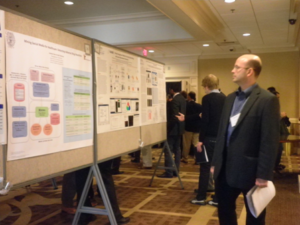News
2022
- (Dec 2022) Our latest paper in Nature Communications (new window) regarding a large scale consortium effort to develop a #federated learning approach for AI models based on #braincancer#imaging . The segmented labels from our REMBRANDT #MRI dataset are part of a world-wide federated platform Federated Tumor Segmentation (FeTS) https://www.fets.ai/ (new window) that allows training specific #machinelearning models by leveraging information gathered from brain cancer datasets residing in collaborating sites without ever exchanging the data. Such a world wide platform enables very large multi-site machine learning models in an effort to accelerate discovery. In this paper, we describe how this #Federated Learning model enabled #bigdata for #Rare Cancer Boundary Detection. This work was published with our collaborators Sypiron Bakas, Sarthak Pati, Ujjwal Baid et al at #UPenn . Read a short summary of the paper here (new window) .
- (June 2022) Read @Georgetown_ICBI team’s latest publication on Enhancing the REMBRANDT MRI collection published with @SpringerNature in Nature @ScientificData. 10.1038/s41597-022-01415-1
- (April 2022) SAVE THE DATE ! for the #AI for #HealthEquity 2022 #Symposium ! The #NIH designated #AIM-AHEAD program (#Artificialintelligence / #MachineLearning #Consortium to Advance #HealthEquity and Researcher #Diversity ) is organizing a Two-day #virtual #conference followed by a 4-week workshop series to discuss cutting edge technologies and the impact of using #AI and #ML in biomedicine and beyond. Read more details here
- (Jan 2022) The Innovation Center for Biomedical Informatics (ICBI) at Georgetown University Medical Center is excited to be collaborating with Medstar Health and Biomedical Graduate Education (BGE) at Georgetown University in the Data Science Training Core. This is part of a new two-year, multimillion-dollar award funded by the National Institutes of Health (NIH). The initiative is one of the four core functions of the Artificial Intelligence/Machine Learning (AI/ML) Consortium to Advance Health Equity and Researcher Diversity (AIM-AHEAD) Program.
The teams will work to develop Artificial Intelligence and Machine Learning Training for Early Career and Minority Investigators Interested in Health Disparities. Read more here.
2021
- Our paper titled “CINdex: A Bioconductor Package for Analysis of Chromosome Instability in DNA Copy Number Data” published in Cancer Informatics in Dec 2016 made it to the top 25 cited articles in the journal Cancer Informatics in the year 2021 ! Read the full paper by Yuriy Gusev, Krithika Bhuvaneshwar et al here : 10.1177/1176935117746637
2020
- (July 2020) Rebecca B. Riggins, Associate Professor of Oncology at Lombardi Comprehensive Cancer Center (LCCC) and Robert A. Beckman, Professor of Oncology and of Biostatistics, Bioinformatics, and Biomathematics, LCCC and the Innovation Center for Biomedical Informatics (ICBI) have received a Department of Defense Breakthrough Award. The grant provides these two partnering Principal Investigators $750K over three years to investigate the role of fast evolving “hypermutator” subclones in generating therapy resistance in ER+/HER2+ double positive breast cancer. Experimental studies in Dr. Riggins’ laboratory will test and refine dynamic precision medicine (DPM), a new approach to precision medicine of cancer that Dr. Beckman has formulated and studied in computerized simulations. Co-investigators include Matthew McCoy, Assistant Professor of Oncology, LCCC/ICBI, Lu Jin, Data Analyst, LCCC, and Chen-Hsiang Yeang, Associate Professor of Statistical Science, Academia Sinica, Taiwan.
2019
- (May 2019) ICBI-Georgetown’s Viral RNA detection pipeline viGEN published in a new Frontiers in Microbiology e-book titled ”Using Genomics, Metagenomics and other omics” ! Access the book here
- (March 2019) ICBI-Georgetown Director Dr. Subha Madhavan made the face of AMIA . Read more here.
- (March 2019) We are in the news again ! ICBI_Georgetown Director Dr. Subha Madhavan talking about ‘Teaching Health Informatics and Its Ethical Implications’ . Read the full story here.
2018 – A Year in Review
Notable achievements from ICBI’s Faculty and Staff during the year
- In Sep 2018, Georgetown University Medical Center named ICBI Director Dr. Subha Madhavan, as its Chief Data Scientist and director of its newly established Office of Health Informatics and Data Science.
- The Office of Health Informatics and Data Science announced a new Master’s in Health Informatics & Data Science (HIDS) program. This prgoram is an industry-driven program, focused on current and emerging technologies that will inform healthcare. Students will gain core competency in data science, big data analytics, artificial intelligence and machine learning applications to achieve Precision Medicine and Value based healthcare. More information about the program can be obtained here.
- Dr. Bob Beckman edited (with Zoran Antonijevic) and published a book on innovative clinical trial designs that have the potential to increase the efficiency of bringing life-altering medicines to patients, Platform Trials in Drug Development: Umbrella Trials and Basket Trials, Chapman and Hall, CRC Press. He contributed 5 chapters, including one with Subha Madhavan and Daphne Guinn. Zoran and Bechman were able to recruit an extraordinary author group for the book ! The books are available via hard cover and kindle on Amazon here.
- Dr. Simina Boca authored two first author papers in JCO precision medicine (April 2018) and PeerJ (Dec 2018), the latter which gathered a fair amount of twitter limelight.She also wrote a blog post about her research-wise year in review.
- Drs. Yuriy Gusev and Subha Madhavan were interviewed numerous times after their paper on the REMBRANDT brain cancer data collection that was published in Nature Scientific Data in Aug 2018. They were interviwed by Genome Web, featured in Healio, GUMC news, and Science Daily. A full collection of news articles about this dataset can be seen here. Our team is humbled that VP Joe Biden not only tweeted about our work, but also personally congratulated Lombardi director Dr. Lou Weiner over the phone for this accomplishment !
- In March 2018, Dr. Matthew McCoy received the Marco Ramoni Distinguished Paper Award for work he presented at the AMIA 2018 Informatics Summit. The Marco Ramoni Award for Translational Bioinformatics is presented annually at the AMIA Joint Summits by the TBI Scientific Program Committee to an author that best exemplifies the spirit and scholarship of Marco Ramoni. In applying informatics methods, Dr. McCoy has helped illuminate basic molecular biology processes relevant to the conquest of human disease.
- Mr. Anas Belouali, Technical Lead and Senior Software Engineer for ICBI, spoke at the 2018 Cancer Centers Administrative Spring Forum (CCAF) that took place in Portland, Oregon on March 18 through 20. The NCI IT meet that makes up part of this forum looks for ways to share IT tools that help cancer centers support research, simplifying a complex and constantly changing medical environment. As a representative of ICBI, Mr. Belouali delivered a highly regarded presentation discussing data mining techniques to integrate research and care.
- The ICBI team comprising of Vishakha Sharma, Simina Boca, Joe Bender, Matt McCoy, Yuriy Gusev, Krithika Bhuvaneshwar, Brent Harris and Subha Madhavan participated in the 2018 Data Science Bowl. The Data Science Bowl is a worldwide competition that brings together data scientists, technologists, and domain experts across industries to take on the world’s challenges with data and technology. In the 2018 Data Science Bowl challenge, the aim was to identify the nuclei in divergent microscopy images, regardless of the experimental setup, over a period of 90 days. Our team approached this automated idenficiation challenge in three different ways and scored in the top 12%.
- Our paper on improving cancer molecular diagnostics (MolDx) reports using eye tracking made it to the prestigious list presented at the Biomedical and Health Informatics Year in Review at the 2018 Annual AMIA Symposium ! Dr. James J. Cimino showcased contributions that represented the most influential or significant work published during the period of September 2017 through September 2018. This paper was authored by authored by Vishakha Sharma, Bob Beckman, Shruti Rao, Peter McGarvey, Subha Madhavan from ICBI and collaborators from the Medstar Research Institute.
- ICBI faculty Drs Yuriy Gusev and Peter McGarvey, together with Dr. Bassam Haddad conductued a two day workshop on Demystifying Biomedical Big data based on the edX online Massive Online Course of the same name in Nov 2018. This workshop was conducted as part of the The 13th Annual BCERP Meeting – Understanding the Link between the Environment and Breast Cancer.
- Dr. Yuriy Gusev conducted a workshop titled ‘Translational Immuno-Oncology in the Age of Big Data – A Bioinformatics Perspective’ at the Immuno Oncology Summit in Boston in Aug 2018. He also conducted a workshop about ‘Data Analytics for Precision Medicine: methods. tools and resources‘ at the 2018 National Institute of Nursing Research Boot Camp in July 2018
- ICBI offers workshops and training through the year to nurture the next generation of informaticians. In 2018, we conducted three pre-symposium workshops in Immuno-oncology informatics, data visualization in R and EHR data mining. Other training condcuted included topics such as RedCap, G-DOC.
- Every year, the Innovation Center for Biomedical Informatics (ICBI) hosts The Annual Big Data in Biomedicine Symposim at Georgetown University. 2018 marked the Seventh Annual Big Data in Biomedicine Symposium at Georgetown University, which brought together over 350 innovators, research scientists, clinicians, educators, and students to exchange ideas, learn new methodologies, and network. Read a full summary of our symposium. Download the presentations and pictures!
2018
2017
On Friday, October 27th, 2017 our 6th Annual Biomedical Informatics Symposium will take place at the GeorgetownUniversity Conference Center and Hotel. This one-day event will include talks by academic, industry, and government leaders in clinical and translational sciences who will highlight technologies, applications of informatics science and tools to advance precision medicine. This symposium will bring together a dynamic community of innovators, research scientists, clinicians, program managers, educators, and students to exchange ideas and learn new methodologies. The symposium also offers an opportunity to network and socialize with colleagues during the evening reception and poster session. This year’s symposium will include sessions on cancer networks, machine learning. Artificial intelligence and other emerging technologies in healthcare and precision medicine as well as a panel discussion on current and future needs for education programs in biomedical informatics and data science. We are delighted to have Dr. Patricia Brennan, NLM Director as the keynote speaker.
2016
Genome Web’s Q & A with Subha Madhavan at the Amia Joint Summits 2016– 3/2016
HIMSS’16: A Bold Shift Towards Precision Medicine– 3/2016
Gene Family Turns Cancer Cells into Aggressive Stem Cells that Keep Growing– 2/2016
The Hoya: Lombardi Researchers Study Cancer Genes– 2/19/2016
Cancer “Moonshot’ Needs Informatics– 1/2016
2015
GUMC News: Triple Negative Brest Cancer in African-American Women has Distinct Difference – 4/22/2015
Amarantus Options Blood-Based Alzheimer’s Biomarkers from Georgetown- 1/15/2015
2014
2013
2012
IPad Application Makes Boring Data Collection History- 12/3/2012





